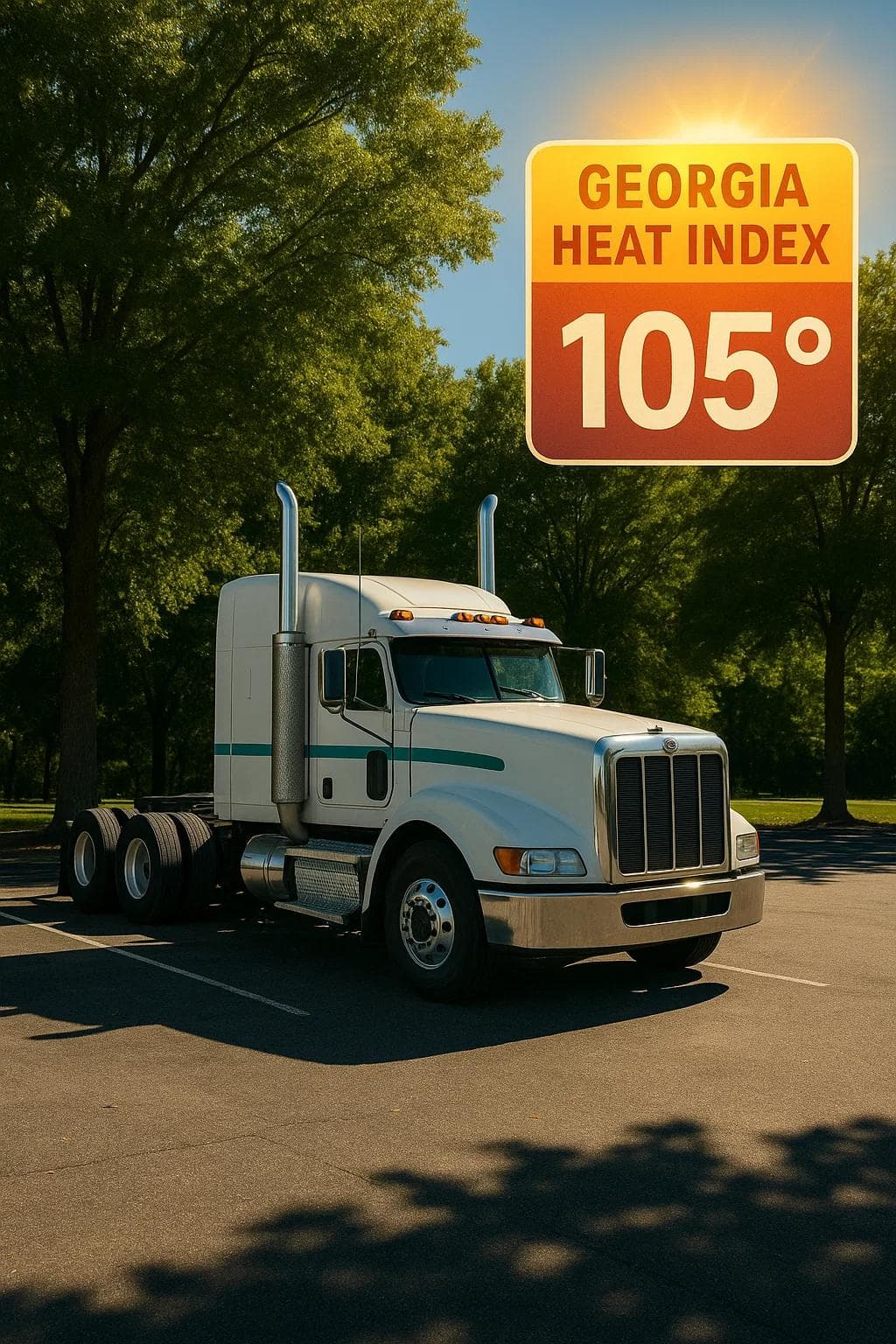
Summer Heat Survival: Truck Parking in Georgia's Hot Season (2025)
Georgia summers are no joke—daytime highs regularly hit 95°F or more, with humidity climbing past 80%. For truck drivers, these conditions create more than just discomfort: they present real safety risks. Heat-related illnesses are rising, equipment stress is increasing, and cargo integrity can be compromised when temperatures stay high around the clock. Fortunately, smart truck parking and preparation can make the difference between a safe delivery and a costly breakdown. Superior Truck Parking has tailored solutions to help drivers beat the heat during Georgia’s long, hot season.
Georgia Summer Weather Reality
Climate Characteristics
From May through September, Georgia drivers experience relentless heat. Daytime temperatures average between 75°F and 98°F, with heat indexes regularly exceeding 105°F. Afternoon storms are common, while nighttime lows often stay above 75°F, giving little relief.
Regional Variations
North Georgia sees slightly cooler mornings influenced by mountain air, but afternoon thunderstorms and occasional drought cycles add complexity. Urban areas like Atlanta suffer from heat islands, while rural regions may offer natural breezes.
Heat Impact on Operations
Extended exposure increases driver fatigue, strains engines and cooling systems, reduces fuel efficiency, and accelerates tire wear. Sensitive cargo is at higher risk of spoilage, while maintenance schedules become tighter to avoid failures.
Health and Safety in Extreme Heat
Heat-Related Illnesses
Recognizing symptoms early is critical:
- Heat exhaustion: heavy sweating, fatigue, nausea, headache, and muscle cramps.
- Heat stroke: high body temperature, confusion, hot dry skin, rapid pulse, and loss of consciousness. This is a medical emergency.
Hydration Strategies
Drivers should drink at least one gallon of water daily, balance electrolytes, and limit caffeine, alcohol, and sugar. Scheduling hydration breaks and monitoring urine color helps prevent dehydration.
Personal Protection
Light-colored, breathable fabrics, cooling towels, portable fans, and sun protection accessories are essential. Rest periods during peak heat hours can save lives.
Stay Safe on the Road – Contact Us TodayTruck Cooling Strategies
Cab Comfort Systems
Maintaining A/C systems with clean filters, proper refrigerant levels, and efficient operation is vital. Auxiliary Power Units (APUs) provide consistent cooling while saving fuel and reducing noise. Battery-powered fans, reflective window shades, and improved ventilation add extra comfort.
Parking Position Strategy
Seek shade on the morning sun side, park away from heat-reflecting structures, allow spacing for airflow, and choose elevated spots for better breezes. Preparing for storms is also key to protecting vehicles and cargo.
Night Cooling
Pre-cool the cab before sleep, use moisture-wicking bedding, and ensure good airflow. Monitor power usage to avoid A/C interruptions and have backup cooling plans ready.
See Our Cooling-Friendly Parking AmenitiesEquipment Protection
Engine and Systems
Check coolant levels, test quality, and inspect for leaks. Adjust oil viscosity for high heat, replace belts and hoses showing wear, and keep spare parts handy.
Tire Management
Heat increases tire pressure, risking blowouts. Inspect tires cold each morning, maintain proper inflation, and replace damaged or aging tires before summer stress sets in.
Cargo Considerations
Reefer units work harder in high heat, increasing fuel use. Monitor temperature-sensitive loads closely, establish emergency protocols, and communicate with customers about delays to protect both cargo and insurance coverage.
Superior Truck Parking Summer Advantages
Our lot is designed with summer survival in mind. Natural shade, wide spacing for airflow, excellent drainage, and level surfaces create a cooler environment than city parking. Located outside Atlanta’s heat island, Superior Truck Parking benefits from cleaner air, higher elevation, and steady breezes.
- Early morning quiet hours for restful sleep
- Storm monitoring and emergency assistance
- Nearby ice availability and maintenance referrals
- Community-driven support for drivers
Reserve Safe Parking at Superior Today"Cooler than city parking." – Driver feedback
"Great drainage during storms." – Driver feedback
"Management understands heat challenges." – Driver feedback
Summer Maintenance at Parking
Daily Checks
- Fluids and tire pressure in the morning
- Inspect belts, A/C operation, and battery
- Adjust brakes and test lights daily
Preventive Measures
Schedule part replacements early, clean systems regularly, and document inspections to stay ahead of failures.
Emergency Preparedness
- Keep tools organized and spare fluids ready
- Store towing contacts and insurance info
- Plan for breakdown recovery supplies
Lifestyle Adaptations
Schedule Optimization
Driving between 4–6 AM or after sunset avoids peak heat. Rest midday and coordinate routes with customers to keep cool.
Nutrition in Heat
Light meals, high water content fruits, and balanced protein help drivers maintain energy without overheating.
Exercise Modifications
Shift workouts to early mornings, reduce intensity, or choose indoor alternatives. Hydration and recovery are essential for health.
Technology and Resources
Weather apps provide heat alerts and storm tracking. Vehicle monitoring apps track system performance, while health apps help drivers monitor hydration and symptoms. Check out our weather resources for real-time updates.
Frequently Asked Questions
- What temperature is too hot for trucking? Above 95°F with high humidity is hazardous.
- How much water should drivers drink? At least one gallon per day.
- Can I idle my truck all day for A/C? Yes, but consider APUs for efficiency.
- What are signs of heat exhaustion? Heavy sweating, weakness, nausea, and headache.
- How does Superior handle storms? We provide monitoring and emergency support.
- Best time to drive in Georgia? Early morning or after sunset.
- How to keep cargo cool without a reefer? Park in shade, ventilate, and monitor closely.
- Should I adjust tire pressure? Always check cold in the morning, not after driving.
- What about pet safety? Keep cab cool and hydrated, never leave pets unattended.
- Emergency numbers? Call 911 for heat illness; keep company contacts on hand.
Conclusion
Georgia’s brutal summer heat is a serious challenge for drivers, equipment, and cargo. With preparation, cooling strategies, and a supportive parking facility like Superior Truck Parking, drivers can stay safe and productive all season long. Plan ahead, stay hydrated, and use resources like our health and wellness guides to stay protected on the road.
Secure Your Summer Parking Spot NowReady to Reserve Your Truck Parking Spot?
Don't wait for secure parking. Reserve your spot at Superior Truck Parking today and enjoy peace of mind with our 24/7 secured facility.
Professional Parking Management: Our facility uses the therighut.com platform for seamless booking and management. This industry-leading software ensures smooth operations and the best experience for our customers.
About Superior Truck Parking
Discover updates, route guides, and driver resources from Superior Truck Parking in Calhoun, GA. Learn about secure parking solutions along I-75 designed for safety, convenience, and compliance.
Related Posts

Tornado Safety for Truckers: Emergency Parking Strategies (2025)
A complete tornado safety guide for truckers in Georgia. Learn emergency parking strategies, storm alerts, and how Superior Truck Parking keeps drivers safe.

Winter Truck Parking in North Georgia: Preparation Guide (2025)
Prepare your truck for North Georgia’s harsh winters. Learn parking strategies, ice storm safety, and how Superior Truck Parking keeps drivers secure all season.

Staying Connected: How Parking Location Impacts Driver Family Life (2025)
Discover how truck parking choices affect family connection and how Superior Truck Parking supports driver work-life balance with reliable connectivity and family-friendly amenities.
